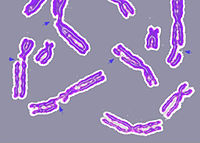
Photo from wikipedia
Inhalation of asbestos fibres can cause lung and pleural diseases in humans and constitutes a severe public health threat worldwide. The aim of the present study was to assess the… Click to show full abstract
Inhalation of asbestos fibres can cause lung and pleural diseases in humans and constitutes a severe public health threat worldwide. The aim of the present study was to assess the biological effects induced in both pulmonary cells (A549) and monocyte/macrophage (RAW 264.7) cell lines by combustion slags obtained from asbestos through a self-sustained high-temperature synthesis (SHS) reaction. The SHS reaction involves rapid thermal treatment and displays great ability to neutralise asbestos. Cytotoxicity, redox status imbalance, lipid peroxide production, DNA strand breaks (comet assay) and chromosomal aberrations (cytokinesis block micronucleus test) were evaluated in cells exposed either to untreated asbestos fibres or to grinded SHS-generated slags of different granulometry, tested in cultured cells at varying doses and for varying exposure times. Our results show that asbestos fibres cause redox status imbalance, especially in monocyte/macrophage cell lines. Moreover, they promote lipid peroxidation and trigger genomic alterations. When the cells were exposed to slag powders, which are the products of SHS asbestos treatment, generation of lipid peroxides and induction of DNA strand breaks still persisted, due to the high content in iron and other metals detected in these samples. However, there was an attenuation of redox status imbalance and an absence of chromosomal aberrations, which probably reflects the loss of the asbestos fibrous structure following SHS reaction, as demonstrated by electron microscopy analyses. In conclusions, SHS-treated asbestos wastes can potentially have deleterious health effects due to the oxidative stress induced by inhaled powders but they loose the asbestos ability to induce chromosomal alterations.
Journal Title: Scientific Reports
Year Published: 2020
Link to full text (if available)
Share on Social Media: Sign Up to like & get
recommendations!